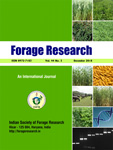PRAKRITI, SRIDEVI T., SARITA DEVI AND SATPAL*
Department of Botany & Plant Physiology
Forage Section, Department of Genetics & Plant Breeding
CCS Haryana Agricultural University, Hisar-125004 (Haryana), India
*(e-mail : satpal_fpj@hau.ac.in)
(Received : 13 May 2022; Accepted : 22 June 2022)
SUMMARY
Jasmonic Acid and methyl jasmonate (MeJA) are collectively known as jasmonates. Jasmonic acid (JA) is a potent signal compound that accumulates rapidly and transiently when plants are under biotic and abiotic stress. Various researchers have conducted studies on the role of endogenous and exogenous JA and its metabolites in defense mechanisms against salinity stress and reported that foliar application of JA under the salt stress, improved the salt stress tolerance. Jasmonates activate plant defense mechanisms in response to insect-driven wounding, various pathogens, and environmental stresses, such as drought, low temperature, and salinity. Application of jasmonic acid in form of MeJA increases the number of leaves as other plant growth promoters including gibberellic and salicylic acid under sodium stress, similarly hows positive effect on increase in the number of tillers, improve plant morphological characters, enhances vegetative growth by increasing fresh
weight, dry weight, and SPAD value in cereal fodder crops under salt stress. JA application can promote the biosynthesis of proline and putrescine under environmental stresses in fodder crops of Brassica family. JA application improves Na+ exclusion either by decreasing passive influx or by increasing the active efflux of Na+. Osmotic stress significantly increased JA levels in root tissues of the salt sensitive fodder maize genotypes. JA and MeJA plays a crucial role in ameliorating the adverse effects of salt stress in cowpea and improve its tolerance to salt stress conditions. In the present review, we discussed the potential role of Jasmonates in alleviating adverse effect of salinity on fodder crop.
Key words: Salinity stress, defense mechanisms, Jasmonic acid, forage crops

